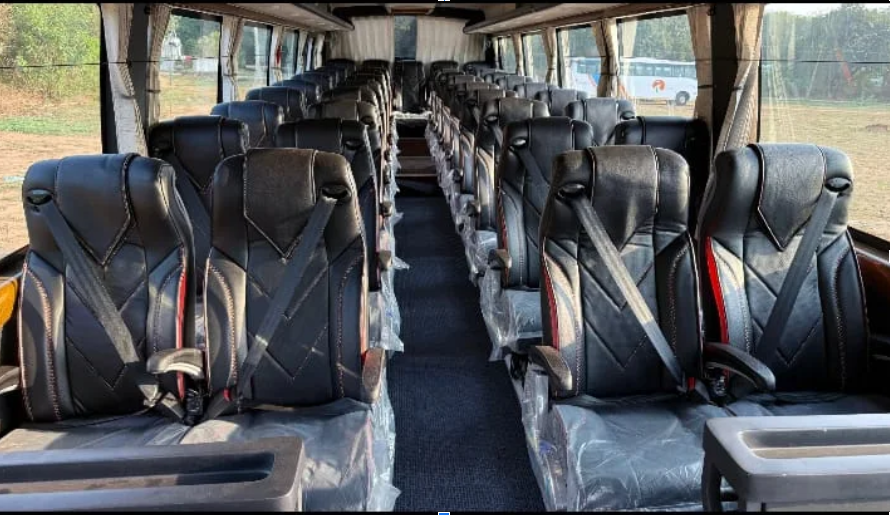Beyond the Carpool: Upgrading Small Group Comfort and Cohesion
Group travel presents countless opportunities for shared experiences, yet the method of transportation often determines whether these journeys become cherished memories or logistical nightmares. When planning outings with friends, colleagues, or family members, the choice between splitting and traveling into multiple vehicles or staying together shapes the entire experience. The difference between fragmented travel and cohesive group journeys lies in selecting the right transportation approach.
Many travellers overlook the transformative impact of mini bus rental in Bangalore options when coordinating group activities. Rather than juggling multiple car keys, fuel costs, and navigation systems, a single vehicle solution streamlines the entire process. This approach eliminates the stress of convoy coordination whilst ensuring everyone arrives together, refreshed and ready to enjoy their destination. The convenience factor alone makes this choice increasingly popular among organised groups.
The Comfort Revolution in Group Transportation
Enhanced Seating Arrangements: Modern mini-buses feature spacious seating configurations that prioritise passenger comfort over cramped conditions. Unlike squeezing into standard cars where someone inevitably draws the short straw for the middle seat, these vehicles offer generous legroom and proper support for extended journeys. The elevated seating position provides better visibility, reducing motion sickness and creating a more pleasant travel experience for all passengers.
Climate Control Advantages: Professional-grade air conditioning systems maintain consistent temperatures throughout the journey, preventing the usual negotiations about window positions and fan speeds. This unified climate control eliminates the discomfort often experienced in overcrowded personal vehicles where some passengers freeze whilst others swelter. The result is a more relaxed atmosphere where everyone can focus on enjoying the company rather than adjusting to uncomfortable conditions.
Privacy and Personal Space Benefits
Reduced Travel Anxiety: The psychological comfort of having adequate personal space cannot be understated when travelling in groups. Mini-buses provide breathing room that prevents the claustrophobic feelings common in packed cars. This extra space allows passengers to relax, stretch, and move naturally without constantly bumping into others. The reduced physical tension translates into better moods and more enjoyable interactions throughout the journey.
Storage Solutions: Proper luggage compartments and overhead storage eliminate the tetris-like packing challenges that plague car journeys. Everyone’s belongings have designated spaces, reducing the risk of forgotten items and eliminating arguments about whose bag takes priority. This organisation extends to smaller items like snacks, entertainment devices, and personal accessories that can be safely stored without cluttering passenger areas.
See also: Think Twice: What You Must Know Before Booking Plastic Surgery in Turkey
Social Dynamics and Group Cohesion
Conversation Flow: The seating arrangement in mini-buses naturally facilitates group conversations rather than the isolated pockets of discussion that occur in separate vehicles. Passengers can easily turn to address the entire group, share observations about the journey, or engage in collective activities. This unified communication environment strengthens relationships and creates shared experiences that begin the moment the journey starts.
Shared Entertainment: The ability to play music, watch films, or engage in group games transforms travel time into entertainment time. Unlike car journeys where audio choices affect only a few passengers, mini-bus entertainment systems accommodate everyone’s preferences through compromise and rotation. This collaborative approach to journey entertainment often produces unexpected bonding moments and inside jokes that become treasured memories.
Practical Advantages Over Multiple Vehicles
Navigation Simplification: Coordinating multiple vehicles requires constant communication about routes, stops, and timing adjustments. Mini-bus travel eliminates these complications through single-point navigation, reducing the likelihood of groups becoming separated or lost. The designated driver can focus entirely on route management whilst passengers contribute to navigation decisions collectively, creating a more efficient and less stressful travel experience.
Cost Efficiency Considerations: Fuel expenses, parking fees, and toll charges multiply dramatically when split across several vehicles. A single mini-bus consolidates these costs whilst often providing better value per passenger. The economic benefits extend beyond direct travel expenses to include reduced wear on personal vehicles and simplified expense sharing among group members.
Convenience and Logistical Benefits
Departure Coordination: Gathering multiple car loads of people invariably involves delays as stragglers arrive, forgotten items are retrieved, and last-minute passenger shuffling occurs. Mini-bus travel centralises these logistics, allowing for more efficient departure procedures and reducing the frustration of waiting for multiple vehicles to achieve readiness simultaneously.
Arrival Management: Coordinated arrival at destinations prevents the common scenario where groups arrive piecemeal, with some members waiting indefinitely for others who may have encountered traffic or navigation issues. This synchronised approach ensures activities can begin promptly and prevents the disappointment of delayed starts due to transportation complications.
Key considerations when evaluating group transportation options include:
- Passenger comfort levels – adequate space and seating quality affect overall journey satisfaction
- Communication capabilities – the ability to interact naturally throughout the journey
- Luggage capacity – sufficient storage without compromising passenger comfort
- Entertainment options – shared systems that accommodate group preferences
- Cost-effectiveness – consolidated expenses versus multiple vehicle costs
- Arrival coordination – ensuring simultaneous arrival for scheduled activities
Environmental and Safety Considerations
Reduced Carbon Footprint: Single-vehicle transportation inherently produces lower emissions per passenger compared to multiple cars carrying the same group. This environmental benefit appeals to eco-conscious travellers who want to minimise their collective impact whilst maintaining travel comfort. The efficiency gains extend beyond environmental concerns to include reduced traffic congestion and parking demand at destinations.
Professional Safety Standards: Licensed mini-bus operators maintain vehicles to commercial standards, often exceeding the safety protocols of personal vehicles. Regular maintenance schedules, professional driver training, and comprehensive insurance coverage provide peace of mind that informal carpooling arrangements cannot match. These safety considerations become particularly important for longer journeys or unfamiliar routes.
Conclusion
The evolution from traditional carpooling to dedicated group transportation represents a significant upgrade in travel quality and group dynamics. Mini-bus solutions address the fundamental challenges of group travel whilst enhancing the social aspects that make shared journeys memorable. The combination of improved comfort, simplified logistics, and enhanced group cohesion creates travel experiences that begin positively and maintain that energy throughout the entire outing. Consider upgrading your next group adventure with dedicated transportation that prioritises comfort, convenience, and collective enjoyment over basic point-to-point movement.



